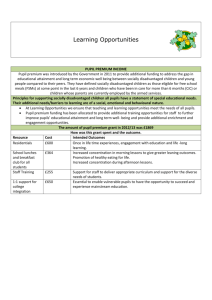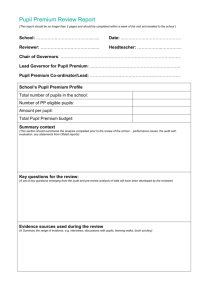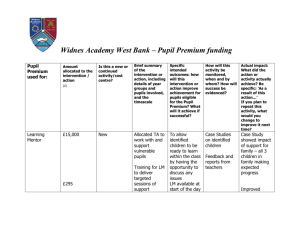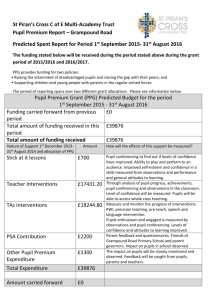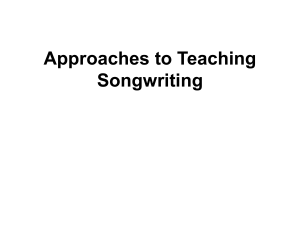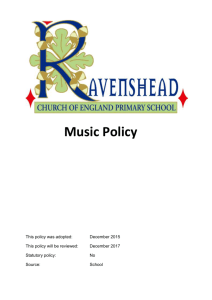Education Technology Service
advertisement
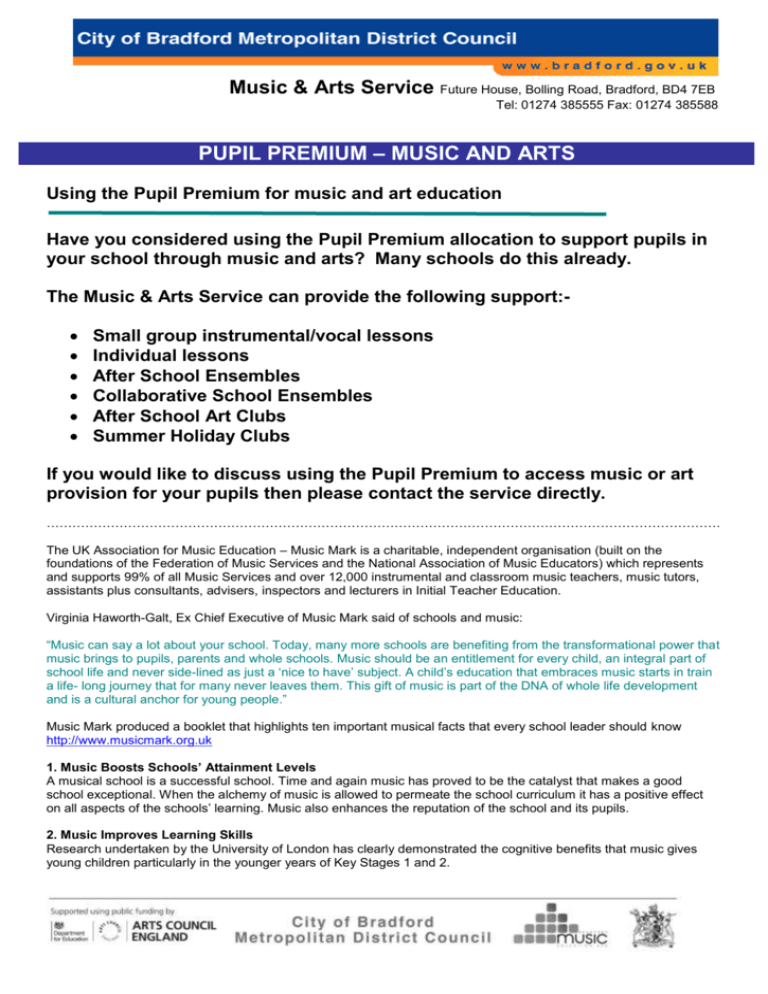
Music & Arts Service Future House, Bolling Road, Bradford, BD4 7EB Tel: 01274 385555 Fax: 01274 385588 PUPIL PREMIUM – MUSIC AND ARTS Using the Pupil Premium for music and art education Have you considered using the Pupil Premium allocation to support pupils in your school through music and arts? Many schools do this already. The Music & Arts Service can provide the following support: Small group instrumental/vocal lessons Individual lessons After School Ensembles Collaborative School Ensembles After School Art Clubs Summer Holiday Clubs If you would like to discuss using the Pupil Premium to access music or art provision for your pupils then please contact the service directly. …………………………………………………………………………………………………………………………………………. The UK Association for Music Education – Music Mark is a charitable, independent organisation (built on the foundations of the Federation of Music Services and the National Association of Music Educators) which represents and supports 99% of all Music Services and over 12,000 instrumental and classroom music teachers, music tutors, assistants plus consultants, advisers, inspectors and lecturers in Initial Teacher Education. Virginia Haworth-Galt, Ex Chief Executive of Music Mark said of schools and music: “Music can say a lot about your school. Today, many more schools are benefiting from the transformational power that music brings to pupils, parents and whole schools. Music should be an entitlement for every child, an integral part of school life and never side-lined as just a ‘nice to have’ subject. A child’s education that embraces music starts in train a life- long journey that for many never leaves them. This gift of music is part of the DNA of whole life development and is a cultural anchor for young people.” Music Mark produced a booklet that highlights ten important musical facts that every school leader should know http://www.musicmark.org.uk 1. Music Boosts Schools’ Attainment Levels A musical school is a successful school. Time and again music has proved to be the catalyst that makes a good school exceptional. When the alchemy of music is allowed to permeate the school curriculum it has a positive effect on all aspects of the schools’ learning. Music also enhances the reputation of the school and its pupils. 2. Music Improves Learning Skills Research undertaken by the University of London has clearly demonstrated the cognitive benefits that music gives young children particularly in the younger years of Key Stages 1 and 2. 3. Music Fosters Team Working Playing in small groups, in whole classes or in any ensemble or orchestra means you are a part of an integrated team. Everyone has a role however large or small and this inter- dependency on one-another helps to build team working and a sense of ownership. 4. Music Enhances Social Skills Playing an instrument or learning to sing requires real concentration. Quietness and calm whether on stage or in the classroom is essential. Working alongside other members of an instrumental or singing group helps children to recognise their own skills and appreciate those of others. This builds life skills and promotes the importance of working harmoniously with others towards a common goal. 5. Music Underpins Better Behaviour To learn music you need discipline. To play well requires regular practice and dedication. There are many occasions where music has had a transformational effect on children and helped turn their lives around. The FMS has case histories of children where regular absenteeism has been replaced by improved attendance when music became part of their learning regime. Research* has shown that success in the arts, including music, changed pupils’ behaviour, increasing concentration levels, developing team work and creating respect for the school environment. (*QCA 2002 Investigation Arts-Rich Schools) 6. Music Encourages Creativity Music stimulates creativity in so many ways through playing and composition. It enables young people to express themselves like no other medium. It is a vital part of learning and a wonderful cultural introduction to life. To succeed today and in the future, children will need to be inventive, resourceful and imaginative. The best way to foster that creativity is through arts education.* Performance enhances freedom of expression and offers both pupils and schools the excitement and prestige of demonstrating their hard won skills whether in the classroom or in public. Music is often the demonstrable embodiment of both parental and school aspirations. (*President’s committee on the arts & humanities 2011. Reinvesting in arts education: winning America’s future through creative schools) 7. Music is for Life The implications are fundamental. An early start in music often results in music becoming a life-long passion. This gift is precious and whilst not all students go on to play in concert orchestras or famous rock bands (although the Music Service alumni reads like a who’s who of musical greats!) the seeds sown in the classroom continue to flourish for a life time of musical enjoyment. 8. Music is an Educational Building Block The Government said in their response to the Henley Review of Music Education: ‘Music is an enriching and valuable academic subject. Research evidence shows that a quality music education can improve self-confidence, behaviour and social skills as well as improve academic achievement in areas such as numeracy, literacy and language.’ 9. Music is Fun Music Making is not only good for the brain but also the heart. Young People enjoy the pleasure of mastering a tune or a song and the prestige and stimulation of a first performance in front of an audience is an adrenalin rush that is never forgotten. 10. Music is for Everyone Music is inclusive irrespective of ability. Studies have shown that music can be of particular benefit to children and young people in challenging circumstances – not only those with Special Educational Needs (SEN) and disabilities but also those who are marginalised, vulnerable and often hard to reach. Music gives SEN/Disabled children a unique motivation to participate and communicate. Advances in technology enable more disabled children than ever to take part in music education. The channels of touch, sight and sound that music offers can also have a profound impact on children who benefit from a therapeutic approach.

